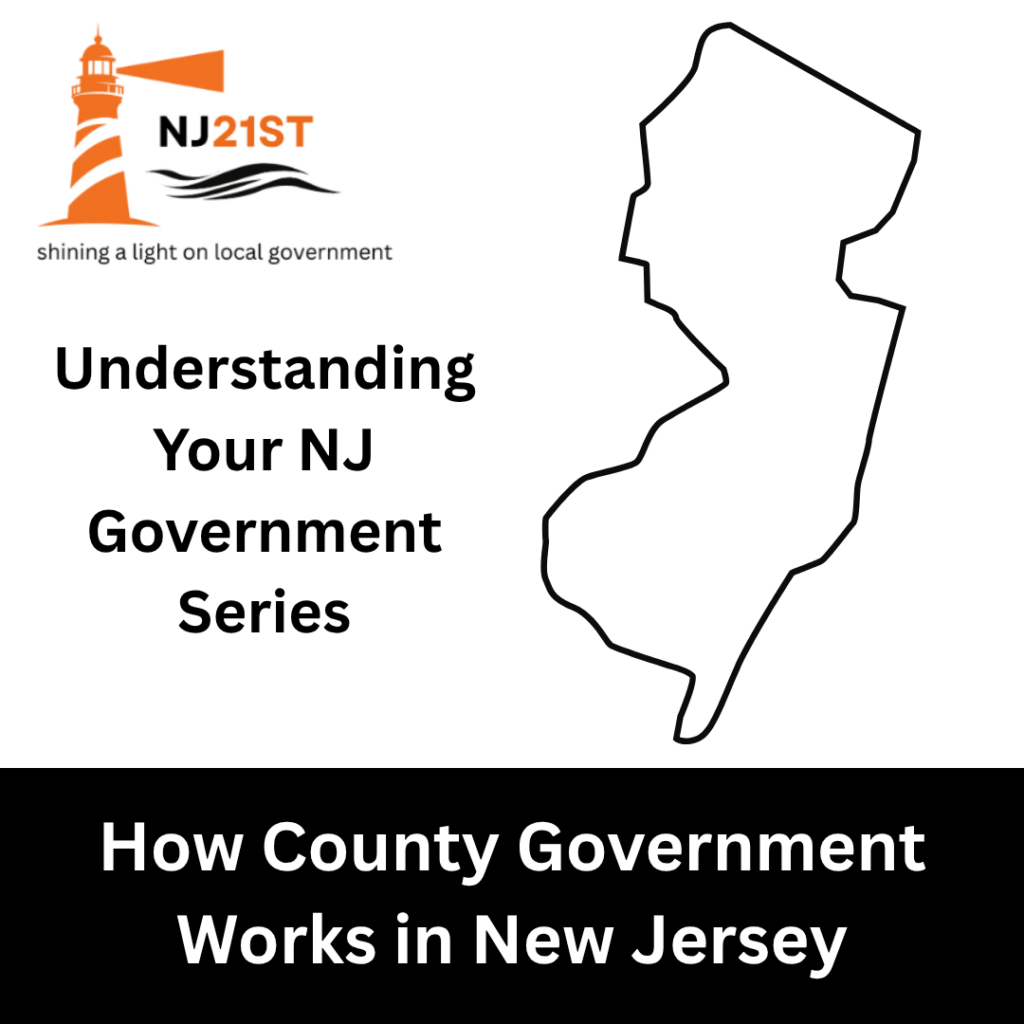This is the second article in an ongoing series intended to help NJ residents, especially students, understand their local and state government.
Our last article covered the different forms of municipal government in NJ and referendum – this second part of the series will look at County Governments in NJ.
Optional County Charter Law
In 1972, counties were given more flexibility in how they governed themselves and were allowed to follow models more in line with state and national bodies as a result of the Optional County Charter Law. These choices allowed counties to become more consistent with the rest of how the state and country operated as they provided for a separation of powers (executive and legislative).
Before the law, each county had a Board of Chosen Freeholders – what we today call a Board of County Commissioners – that passed laws AND handled administrative work.
Since the law passed, 15 counties still follow the traditional with one difference – an appointed Administrator that manages day-to-day tasks.
County governments don’t have more power than towns or cities, they’re more like regional coordinators that meet regional needs local townships aren’t equipped to deal with.
Some areas County Governments cover include…
-Design and maintenance of county roads that cross multiple towns
-Restaurant inspections
-Coordination of local Boards of Health
-Property assessment appeals
-Election ballots
-County jails
Think of them as a sort of bridge between local and state government- they implement state mandates and help towns share services.
Models
County Executive with a Board of County Commissioners (Atlantic, Bergen, Essex, Hudson, Mercer, and Union Counties)
The County Executive -like a CEO – prepares budgets, oversees departments, and enforces county ordinances. Commissioners – like a Town Council – set policy, pass resolutions, and approve spending.
Union County, as an example, operates under the County Executive Plan, but its charter specifies that executive duties are carried out by an appointed Manager, not an elected Executive. This makes it similar to a manager system but it’s still part of the County Executive form.
Board of County Commissioners (Used by most NJ counties, including Somerset, Morris, and Middlesex. Also called “Commissioners-only” or “traditional model”. “Freeholder” was replaced with “County Commissioner” in 2021.)
There is no Executive but instead, a board appointed Administrator that runs the day-to-day operations. There is also a Director, chosen by the Board- the person occupying that seat rotates annually.
In Somerset County, as an example, there are five Commissioners who share both legislative and administrative responsibilities while an Administrator is appointed by the Board to deal with staff and budgets.
Two other plans (the County Supervisor and Board President models) were also available to Counties under the ’72 law but aren’t used by any NJ counties.
Key Terms
County Executive: The chief administrator who oversees departments and budgets and enforces county ordinances- are either elected or appointed.
County Manager: Appointed by County Commissioners to carry out executive responsibilities. Union County uses this form instead of an elected County Executive.
Board of County Commissioners: Similar to a Town Council – set policy, pass resolutions, and approve spending. Referred to as Board of Chosen Freeholders before 2021.
Commissioner Director: A member of the Board of County Commissioners chosen each year to serve as presiding officer or chair.
County Administrator: Appointed and responsible for managing the day-to-day operations of county government. Found in counties that don’t have a County Executive or County Manager.
Optional County Charter Law: A 1972 New Jersey law that allows counties to adopt different forms of government.
County Ordinance: A law/regulation passed by the Board of County Commissioners that applies county-wide
Regional Services: Programs provided by the county serving multiple towns (roads, parks, courts, and health departments).
Check Wiki for Full Series (developing)
Voluntary contributions are critical to independent, fact based reporting. If you appreciate our work please consider a financial contribution.
|



